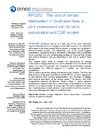Southeast Asia is at a time one of the most vulnerable region to the impacts of a changing climate, with millions of its inhabitants still trapped in extreme poverty without access to energy and employed in climate-sensitive sectors, and, potentially, one of the world’s biggest contributors to global warming in the future. Fortunately, major Southeast Asian countries are also implementing policies to improve their energy and carbon efficiency and are discussing if and how to extend these further.
The present study aims to assess the implications for energy consumption, energy intensity and carbon intensity in the Southeast Asia region of a set of short-term and long-term de-carbonization policies characterized by different degrees of ambition and international cooperation.
The analysis applies two energy-climate-economic models. The first, the fully dynamic Integrated Assessment model WITCH, is more aggregated in the sectoral and country representation, but provides a detailed technological description of the energy sector. The second, the ICES Computable General Equilibrium model, offers a richer sectoral breakdown of the economy and of international trade patterns, but is less refined in the representation of technology. The joint application of these two complementary models allows to capture distinct and key aspects of low-carbon development paths in Southeast Asia.
- jel: Q54, Q58, C68
CMCC Divisions
Authors
- Keywords: Climate change mitigation, Asian economies, Computable General Equilibrium Models


